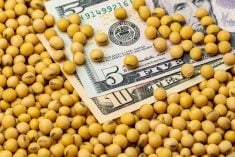French durum wheat producers aim to expand exports through a trading joint venture in a riposte to expected stiffer competition from Canada, the world’s top exporter of the pasta ingredient, the head of the French venture said.
The ending last year of the Canadian Wheat Board’s marketing monopoly in Western Canada has shaken up the grain trade, encouraging deals such as Glencore’s takeover of top Canadian grain handler Viterra.
The French trading operation, called Durum, will pool durum marketing activities of two grain co-operatives, Axereal and Arterris, in a bid to offer the volume and quality to satisfy buyers in nearby importing countries such as Italy and Algeria, Jean-Philippe Everling, head of the joint venture, said.
Read Also

U.S. grains: Soy futures post biggest monthly gain in nearly five years on China trade optimism
U.S. soybean futures climbed to a 15-month high and posted their biggest monthly gain in nearly five years on Friday following a rally fueled by the prospect of revived exports to China.
“The dismantling of the Canadian Wheat Board accelerated our groups’ thinking process,” he told Reuters by telephone.
“This (reform in Canada) has attracted large multinationals that weren’t interested in durum before. The market is more fluid, aggressive and volatile than it used to be.”
Canada claims about half of some seven million tonnes in annual global trade in durum, a much smaller market than common wheat used for bread that has flows of at least 120 million tonnes.
The Durum joint venture, which will start trading on July 14 after being announced in November, aims to expand its export volumes to 1.5 million tonnes a year, compared with just over 1 million tonnes handled by the cooperatives in the past two seasons.
The tie-up between Axereal, already a major grain trader via its Granit unit headed by Everling, and Arterris will offer durum from two growing regions, reducing supply risks, he said.
But strict requirements from semolina mills, which tend to use different durum origins to achieve a very precise quality, also meant the joint venture would trade non-French grain to satisfy clients, he said.
The share of foreign supply would increase and could range from one-third to half of Durum’s traded volumes, he said.
French durum production should fall this year, after a sharp decline in the sown area, and Everling said a crop of about two million tonnes was expected, compared with 2.4 million in 2012.
Crop quality would be particularly important after poor quality reported in fellow European producers Greece, Italy and Spain, he said, adding it was too early to assess with harvesting of durum only just starting in France.
— Valerie Parent and Gus Trompiz report for Reuters from Paris.











